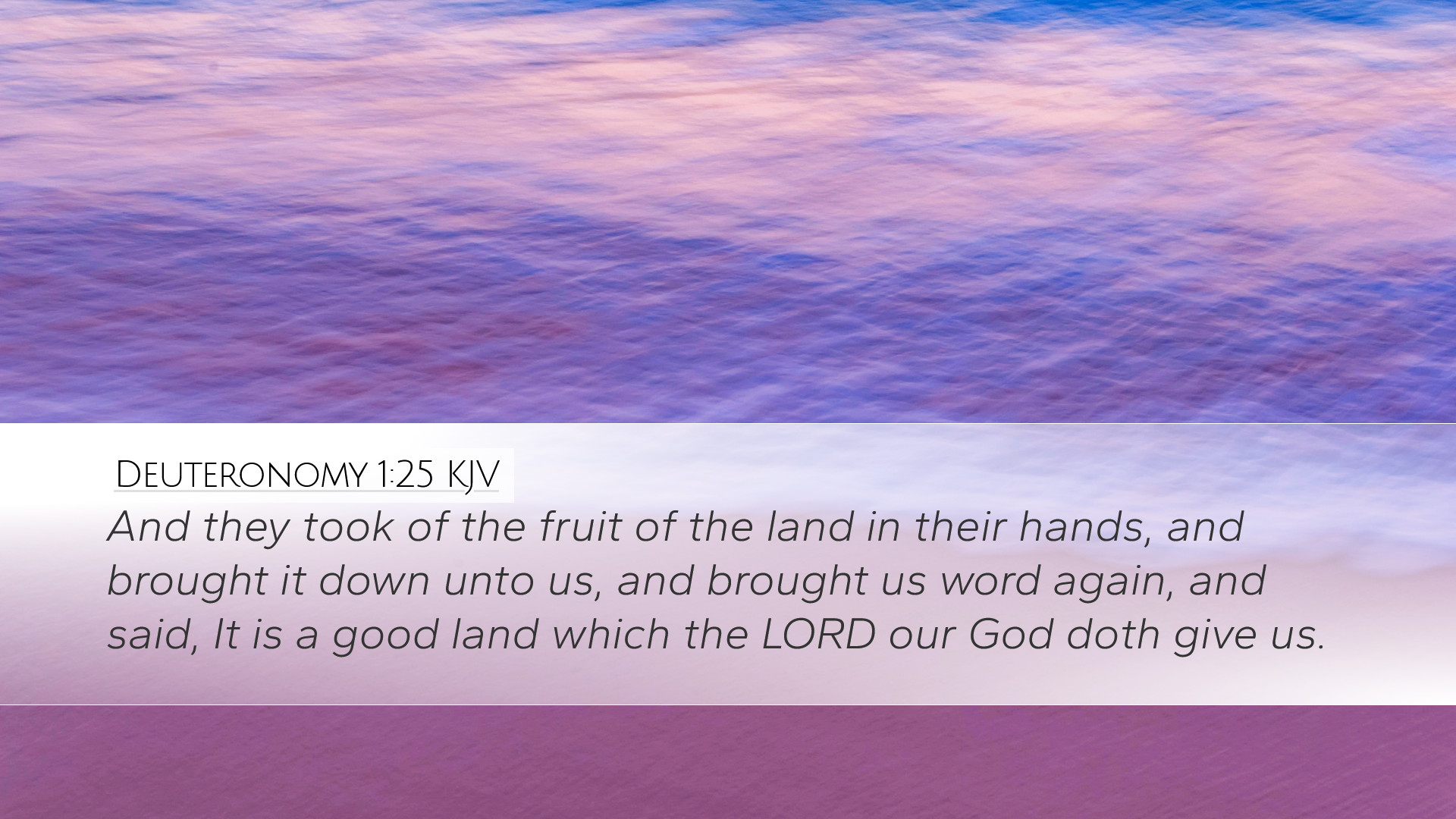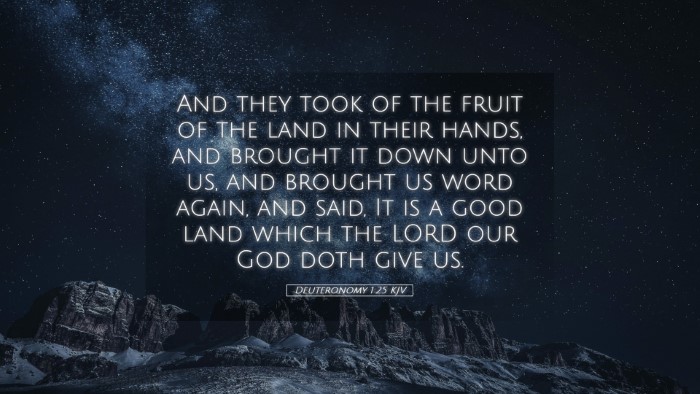Commentary on Deuteronomy 1:25
Contextual Overview
Deuteronomy 1:25 falls within a significant section of the Pentateuch where Moses recounts Israel's journey from Egypt to the Promised Land. It serves as a pivotal moment where the people of Israel reflect on their circumstances and the divine guidance provided to them. This verse specifically highlights the people's self-assessment as they approach a critical juncture in their journey.
Text of Deuteronomy 1:25 (KJV): "And they took of the fruit of the land in their hands, and brought it down unto us, and said, It is a good land which the Lord our God doth give us."
Analysis of Deuteronomy 1:25
This verse provides rich theological and practical implications worthy of exploration. Commentary from historical theologians such as Matthew Henry, Albert Barnes, and Adam Clarke sheds light on the nuances of this text.
Moses' Recollection
Matthew Henry emphasizes the importance of recollection in Moses' speech. He notes that Moses reminds the Israelites of the account of the spies who went into Canaan and returned with a report. Their act of bringing back fruit serves not merely as evidence but as a symbol of God’s promise to provide for His people.
Henry argues that this act functions as a demonstration of God's generosity: “God blessed the land from which they brought the fruit.” The mention of the land being 'good' aligns with the covenant promise, reinvigorating the faith of the Israelites who were doubting their fate.
The Symbolism of the Fruit
Adam Clarke explicates the theological significance of the fruit brought from the land. The fruit serves as a tangible representation of the land's fertility and potential that awaited the Israelites. Clarke highlights that the “good land” signifies not only physical sustenance but also spiritual prosperity and divine providence.
Clarke notes that the spies’ report acted as a crucial linchpin in their understanding of God’s faithfulness. It reflects their experiences of God’s glory and the thread of redemption evident throughout their journey.
The Exhortation to Faith
Albert Barnes focuses on the exhortative nature of the statement. He remarks that the evidence brought by the spies should have served as encouragement to the Israelites to trust in God fully. Instead of leading to fearful hesitation, the report should have galvanized their faith in the promises made to them.
Barnes warns that while the land is indeed good, the challenges ahead are not insignificant; yet, the Israelites must lean on their knowledge of God’s past faithfulness as a foundation for their future hope.
Theological Implications
The story encapsulated in Deuteronomy 1:25 serves as a narrative framework for understanding God's character, especially His enduring faithfulness through trials. The good land symbolizes the abundant life found in obedience and trust in God.
- Divine Providence: The verse underscores that what God promises, He provides—a theme evident throughout the Pentateuch.
- Human Responsibility: While God's provisions are sure, the human response of faith and courage is essential in claiming the blessings of God.
- Reminder of Past Faithfulness: The recollection of God's previous acts of goodness serves as a catalyst for future trust, urging believers today to remember and recount God's faithfulness in their own lives.
- Faith Amidst Challenges: The fruit signifies hope even before the land has been fully inherited, encouraging believers to choose faith in uncertain times.
Application for Today
The lessons extracted from Deuteronomy 1:25 are profoundly relevant to pastors, students, theologians, and Bible scholars. It calls for a reflective examination of one's spiritual journey.
- Faith in God’s Promises: Just like the Israelites were reminded of the good land, contemporary believers are called to remember and trust the assurances provided by God, especially in times of doubt.
- Sharing Testimonies: The act of bringing the fruit back serves as a model for sharing personal testimonies of God’s goodness, creating a culture of encouragement in faith communities.
- Preparing for the Challenge: As challenges approach, believers are reminded to stand firm in their understanding of God’s faithfulness, preparing spiritually to seize the promises ahead.
- Recollecting God’s Goodness: Regularly recounting God's past provisions can enhance faith and fortify believers in their current trials, ensuring they do not waver when faced with future challenges.
In conclusion, Deuteronomy 1:25 serves a dual purpose—it recalls the tangible evidence of God's faithfulness and serves as an exhortation towards steadfast faith. The deep insights drawn from public domain commentaries encourage believers to reflect on God’s goodness and remain resolute in the face of adversity.


